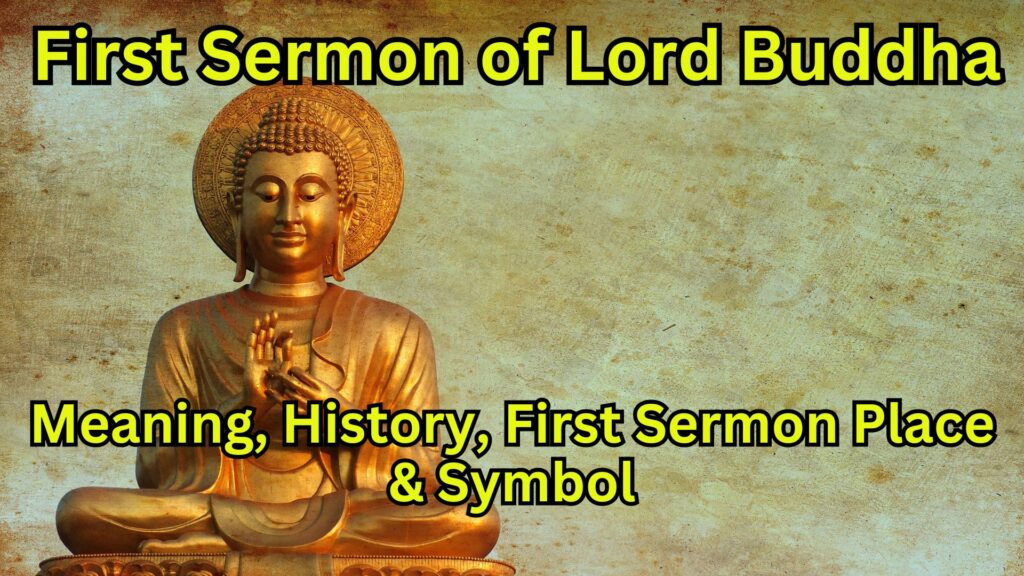First Sermon of Lord Buddha: Date, Meaning, History, First Sermon Place & Symbol

The first sermon of lord buddha, first sermon of lord Buddha meaning, buddha first sermon, first sermon, first sermon meaning
The first sermon of Lord Buddha, also known as the “Dhammacakkappavattana Sutta” (Setting the Wheel of Dhamma in Motion), holds significant meaning for Buddhists in Bhutan, as in other Buddhist countries. This sermon encapsulates the fundamental teachings of Buddhism and is revered for its profound insights.
Buddha first sermon date
In 2024, the Buddha’s first sermon will be observed on Wednesday, July 10th.
Lord Buddha first sermon is known as
Lord Buddha’s first sermon is known as the “Dhammacakkappavattana Sutta,” which translates to “Setting the Wheel of Dhamma in Motion.” This sermon marks the beginning of his teaching career and outlines the core principles of Buddhism, including the Four Noble Truths and the Eightfold Path.
Buddha first sermon place
The first sermon of Lord Buddha, the “Dhammacakkappavattana Sutta,” was delivered at the Deer Park in Sarnath, near Varanasi, India. This location is significant in Buddhism and is a major pilgrimage site.
First sermon of Buddha symbol
The symbol commonly associated with the first sermon of Buddha is the Dharmachakra or Dharma Wheel.
Buddha's first sermon summary
Buddha’s first sermon, known as the “Dhammacakkappavattana Sutta” (Setting the Wheel of Dhamma in Motion), was delivered at the Deer Park in Sarnath. Here’s a summary of its key points:
The Middle Way (Majjhima Patipada)
Buddha’s sermon begins with the principle of the Middle Way, advocating for a balanced approach to spiritual practice, avoiding the extremes of self-indulgence and self-mortification. This concept is crucial in Bhutanese Buddhism, emphasizing a harmonious and moderate lifestyle.
The Four Noble Truths (Cattāri Ariyasaccāni)
These truths are the cornerstone of Buddhist teachings and are deeply ingrained in Bhutanese spiritual practices:
1. Dukkha: The truth of suffering. Recognizing that life inherently involves suffering, which includes physical and emotional pain, impermanence, and the inability to satisfy desires.
2. Samudaya: The truth of the origin of suffering. Understanding that suffering arises from cravings, attachments, and ignorance.
3. Nirodha: The truth of the cessation of suffering. Realizing that it is possible to end suffering by eliminating its causes.
4. Magga: The truth about the path that brings an end to suffering. Following the Eightfold Path to overcome suffering and achieve enlightenment.
The Eightfold Path (Ariya Atthangika Magga)
This path provides practical guidelines for ethical and mental development, leading to the cessation of suffering and enlightenment. The Eightfold Path is highly respected and practiced in Bhutan:
1. Right Understanding (Samma Ditthi): Grasping the Four Noble Truths and the nature of reality.
2. Right Intent (Samma Sankappa): Cultivating thoughts of renunciation, loving-kindness, and compassion.
3. Right Speech (Samma Vaca): Speaking truthfully and avoiding harmful speech.
4. Right Action (Samma Kammanta): Conducting oneself ethically by avoiding actions that cause harm.
5. Right Livelihood (Samma Ajiva): Choosing a livelihood that does not harm others and aligns with ethical principles.
6. Right Effort (Samma Vayam: Making a conscious effort to develop wholesome states of mind and abandon unwholesome ones.
7. Right Mindfulness (Samma Sati): Developing awareness and mindfulness of the body, feelings, mind, and mental phenomena.
8. Right Concentration (Samma Samadhi): Cultivating deep meditation and mental focus.
Significance in Bhutan
In Bhutan, the first sermon of Lord Buddha is not only a religious text but also a guiding philosophy that influences everyday life, governance, and cultural practices. The principles of the Middle Way and the Four Noble Truths resonate with Bhutan’s unique approach to development, which prioritizes Gross National Happiness over Gross Domestic Product, emphasizing the well-being and happiness of its people.
The sermon is celebrated and studied extensively in monasteries and among lay practitioners. It serves as a foundation for ethical living, spiritual practice, and the pursuit of enlightenment, deeply embedding the values of compassion, mindfulness, and wisdom in Bhutanese society.
Overall, the first sermon of Lord Buddha remains a vital and transformative teaching that continues to guide and inspire the people of Bhutan in their spiritual and daily lives.
